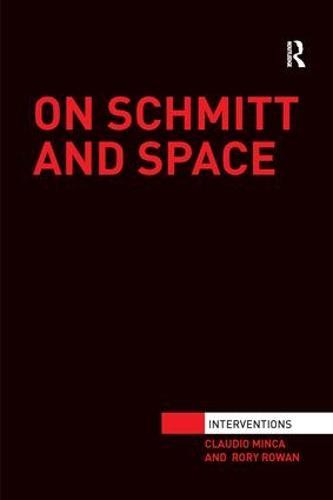Overview
This book represents the first comprehensive study of the influential German legal and political thinker Carl Schmitt’s spatial thought, offering the first systematic examination from a Geographic perspective of one of the most important political thinkers of the twentieth century. It charts the development of Schmitt’s spatial thinking from his early work on secularization and the emergence of the modern European state to his post war analysis of the spatial basis of global order and international law, whilst situating his thought in relation to his changing biographical and intellectual context, controversial involvement in Weimar politics and disastrous support for the Nazi regime. It argues that spatial concepts play a crucial structural role throughout Schmitt’s work, from his well-known analyses of sovereign power and states of exception to his often overlooked spatial history of modernity. Locating a fundamental relationship between space and ‘the political’ lies at the core of his thought. The book explores the critical insight that Schmitt’s spatial thought bears on some of the key political questions of the twentieth century whilst tracking his profound and enduring influence on key debates on sovereignty, international relations, war and the nature of world order at the start of the twenty first century.
Full Product Details
Author: Claudio Minca (University of Wageningen, the Netherlands) ,
Rory Rowan (University of Zurich, Switzerland)
Publisher: Taylor & Francis Ltd
Imprint: Routledge
Weight: 0.453kg
ISBN: 9780415784504
ISBN 10: 0415784506
Pages: 298
Publication Date: 30 November 2016
Audience:
College/higher education
,
Postgraduate, Research & Scholarly
,
Undergraduate
Format: Paperback
Publisher's Status: Active
Availability: In Print

This item will be ordered in for you from one of our suppliers. Upon receipt, we will promptly dispatch it out to you. For in store availability, please contact us.
Reviews
Minca and Rowan show in great detail that Schmitt was a deeply spatial thinker and argue very persuasively that his multi-layered spatial understanding of politics remains a source of useful insights in the 21st century. In the process, they also provide a model well worth emulating of how to approach 'tainted' thinkers without either whitewashing their misdeeds or needlessly jettisoning their real contributions. -- Professor Matthew Hannah, Chair of Cultural Geography, Geographic Institute, University of Bayreuth Carl Schmitt's writings have had an outsized, and often misunderstood, influence on the spatial turn in political theory, as well as the philosophical turn in political geography. By reading Schmitt's oeuvre as an ongoing quest for spatial order, Minca and Rowan offer a new and comprehensive entry point for understanding, and critiquing, one of the 20th century's most important political thinkers. -- Professor Philip Steinberg, Professor of Political Geography and Director of IBRU: Centre for Borders Research, Durham University
Author Information
Claudio Minca is Professor and Head of Cultural Geography at Wegeningen University, the Netherlands. Rory Rowan is a postdoctoral researcher in the Department of Geography at the University of Zurich, Switzerland.




